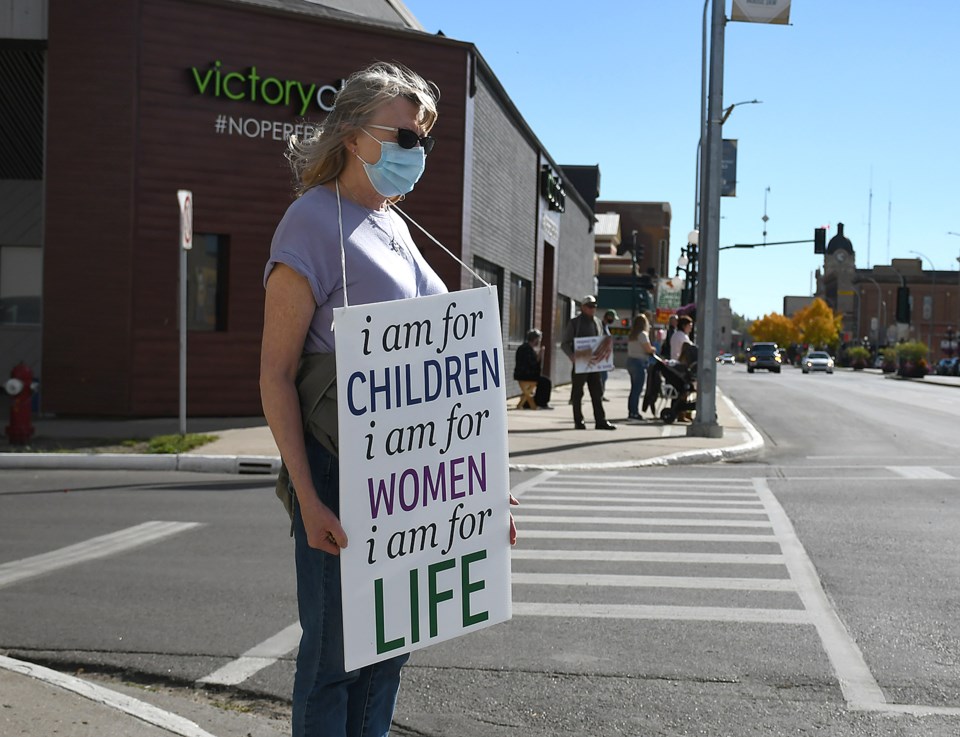Moose Jaw Right to Life’s mission is to promote the sanctity of all human life from conception to natural death and is peacefully pushing back against not only abortion but also euthanasia.
The word “abortion” can stir up various emotions in people, and while it may only be a word, it is powerful, said vice-president Ron Hardy. While this word means the cessation of pregnancy by expulsing an embryo or fetus, at its core, it is really about an issue of vital importance — the sanctity of human life.
Statistics from Campaign Life Coalition show there are roughly 100,000 surgical abortions committed yearly in Canada, he continued. Abortion became legal — with some restrictions — in this country in 1969, and since then, it has killed four million pre-born babies.
“Canada is the only democracy in the world to have zero legal protection for pre-born children. Every other country recognizes the humanity of pre-born children at some point and has found a way to protect them,” said Hardy.
“We seek common ground with all Canadians to develop a starting point for laws protecting our youngest neighbours,” he added. “Concepts that people support — as indicated by public surveys — include parental consent mandates and restrictions on sex-selective and late-stage abortion.”
Parental consent
Parental consent is needed for minors to obtain things such as body piercing, tattoos and tanning in salons because teens do not have the maturity to make these life-changing decisions on their own, Hardy pointed out.
However, pregnant teenage girls are permitted to have an abortion without their parents’ knowledge. A parental consent law would not prevent a young woman from requesting and receiving an abortion, but it would ensure parents of vulnerable girls are involved in the process.
“… parents who are aware their daughter has gone through this experience will be in a better position to assist with any physical and psychological care after the procedure,” said Hardy.
Sex-selective abortion
This practice terminates a pregnancy based upon the predicted sex of the infant and disproportionately targets baby girls in the womb, he continued.
Easy access to abortion and advances in prenatal sex determination have combined to make Canada a haven for parents who would terminate female fetuses in favour of having sons, despite overwhelming censure of the practice, economists and bioethics experts say.
Late-term abortion
Six countries — including Canada, North Korea, China, Vietnam, Singapore, and the Netherlands — allow elective abortions after 20 weeks of pregnancy, said Hardy.
Of 198 countries, independent states, and regions worldwide, 59 allow abortion without restriction as to the reason, otherwise known as elective abortion or abortion on demand, the Charlotte Lozier Institute report found.
The remaining 139 countries require some reason to obtain an abortion ranging from most restrictive — to save the mother’s life or completely prohibited — to least restrictive — on socioeconomic grounds — with various reasons, including physical health or mental health.
“Upholding laws restricting abortion on demand after 20 weeks would situate Canada closer to the international mainstream, instead of leaving it as an outlying country with ultra-permissive abortion policies,” Hardy added.
Euthanasia
Euthanasia is a misguided answer to a real human problem, and while Moose Jaw Right to Life acknowledges that some people face a life of unimaginable pain, it believes the only acceptable and loving response is to provide the most compassionate care and pain management possible, he continued. To make that a possibility, it advocates for more access to the best hospice care possible.
“Canadian law has allowed the rich and the poor to kill themselves if they are too poor to continue living with dignity. In fact, the ever-generous Canadian state will even pay for their deaths. What it will not do is spend money to allow them to live instead of killing themselves,” Hardy remarked.
For some of Canada’s poorest citizens, coercion in death is not some distant fear promoted by conspiracy groups but is a daily pressure. Anytime a country embraces “death with dignity” or “medical aid in dying” or some other euphemistically disguised lack of compassion, a price tag is placed on people, he continued.
It is cheapened whenever a price tag is placed on something inherently priceless. In Canada’s case, the money goes to the so-called “autonomy” of vulnerable people instead of fighting for their lives.
“Every human being is made in the image of God and is crowned with glory and honour, a dignity we dare not ignore,” Hardy said.
Opposition to abortion and euthanasia is based on the same reasoning as Christian opposition to slavery and its subsequently evil dehumanizing treatment of African Americans, while the crusade to end both was — and is — God’s work, he remarked.
“The same liberating power that broke the chains of slavery demands that we see the dignity of all human life and work to protect all people,” he added.




